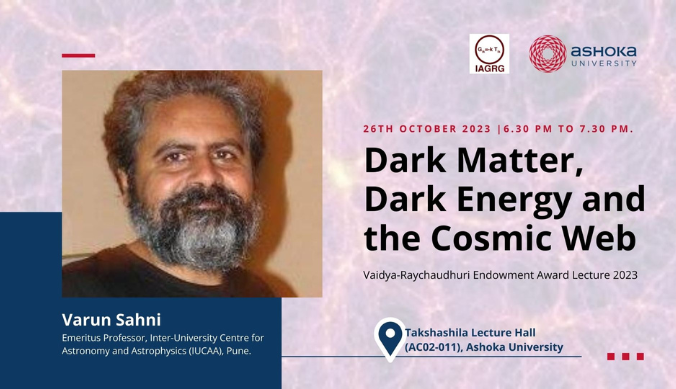
Dark Matter, Dark Energy and the Cosmic Web


Abstract: The expanding universe consists of galaxies which, far from being randomly distributed, cluster together to form the Cosmic Web. The cosmic web consists of a highly filamentary network of `superclusters’ of galaxies, each of which can contain tens of thousands of galaxies and span hundreds of Megaparsec. Superclusters are separated from each other by vast empty regions of enormous size called Cosmic Voids. The cosmic web is made up of baryons and leptons which constitute stars, the intergalactic medium, etc. Additionally, the web contains copious amounts of non-luminous `dark matter’. Dark matter is non-baryonic in nature and outweighs all the luminous matter in the universe by a factor of nearly ten. The composition of dark matter is presently unknown but it could be in the form of tiny weakly interacting elementary particles or massive black holes. In addition to baryons, leptons, and dark matter the universe also contains a mysterious component called dark energy. Unlike normal forms of matter which have positive pressure, dark energy has a large negative pressure which causes the expansion of the universe to accelerate with time. Dark matter and dark energy together make up 96% of the universe, with only 4% being contained in baryons, leptons, and photons. Numerous models have been advanced to explain the origin of dark energy including Einstein’s famous idea of the cosmological constant, as well as more recent advances such as dynamical dark energy, modified gravity, and extra dimensions. I will attempt to summarize our current understanding of the cosmic web, dark matter, and dark energy and the interplay between them.
Registration: As the seats at the venue and transportation (to and fro Jahangirpuri Metro Station) are limited, the individuals interested in attending the event are requested to register via this link. Registration deadline is October 16, 2023 End of the Day. Please note that registration is free.
Transportation: Limited transportation to and fro Jahangirpuri Metro Station will be arranged on the event day, details of which will be updated here soon.
About the Speaker: Varun Sahni is an Emeritus Professor at the Inter-University Centre for Astronomy and Astrophysics (IUCAA), Pune. He did his BSc at St. Stephens College in Delhi and his MSc and PhD at Moscow State University where he worked under the supervision of distinguished Soviet scientists Prof. Ya.B. Zeldovich and Prof. A.A. Starobinsky. He joined IUCAA in 1991 after working as a post-doctoral fellow in the UK and Canada. He has delivered invited/plenary talks at international conferences held in several countries including the USA, France, UK, Ireland, Germany, Greece, Portugal, Iran, Korea, Japan, Brazil, Estonia, Russia, and India. Prof. Sahni has written over 100 highly cited papers and reviews in leading international journals. He is a fellow of the Indian Academy of Science, the National Academy of Science of India, the Indian National Science Academy (INSA), and The World Academy of Science (TWAS). Prof. Sahni is the recipient of numerous awards including the Shanti Swarup Bhatnagar Award, the Vikram Sarabhai Award, the Homi Jehangir Bhabha medal, and the J.C. Bose national fellowship. Prof. Sahni works in the field of Cosmology with a focus on black holes, the physics of the early universe, gravity waves, the cosmic web, modified gravity & extra dimensions, dark matter, and dark energy.
About IAGRG: Indian Association of General Relativity and Gravitation (IAGRG) was formed in the year 1969 as a society of Indian relativists. Renowned Indian relativist Prof. P C Vaidya proposed the formation of this society, and the founder President of the society was Prof. V. V. Narlikar. The aim of IAGRG is to promote interest in the phenomena related to Gravitation and to facilitate research in the related areas. Currently, IAGRG has 524 registered members across India. IAGRG sponsors and supports national level IAGRG Meetings, international level ICGC Meetings and more specialised Meetings/Workshops/Schools on Gravity and related topics. Three different kinds of recognitions are also awarded by IAGRG, such as Vadiya-Raychaudhuri Endowment Award, V V Narlikar Best Thesis Award and N R Sen Young Research Award. To know more about IAGRG visit their website.
About Vaidya-Raychaudhuri Endowment Award: The Vaidya-Raychaudhuri Award was instituted as a tribute to the two doyens of Indian relativists, P. C. Vaidya and A. K. Raychaudhuri. The award is given in recognition of the contributions made both in research and teaching of General Relativity and its applications to astrophysics and cosmology. The awardee is invited to deliver the Vaidya-Raychaudhuri Endowment Award Lecture which is generally meant to be accessible to the wider general relativity audience. The first Vaidya-Raychaudhuri Endowment Award Lecture was delivered in the 15th IAGRG in 1989 and has been an integral part of the IAGRG meetings ever since. Since the 26th IAGRG Meeting in 2011, the Vaidya-Rauchaudhuri Endowment Award Lecture has been held every year.
Looking forward to your participation.
Warm Regards,
Department of Physics